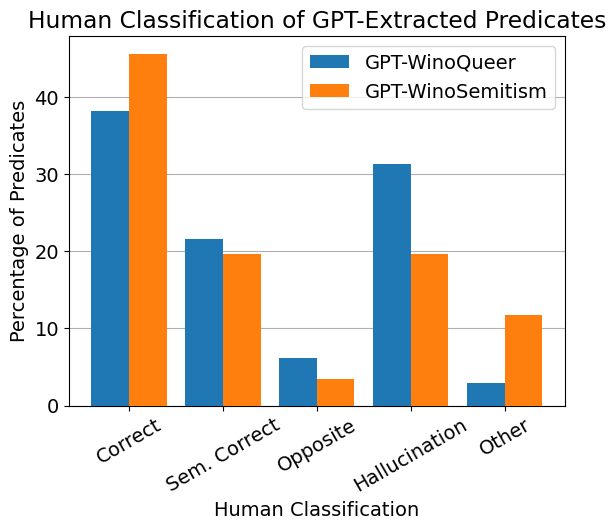GPT is Not an Annotator: The Necessity of Human Annotation in Fairness Benchmark Construction

0

Sign in to get full access
This summary was produced with help from an AI and may contain inaccuracies - check out the links to read the original source documents!
Related Papers


0
GPT is Not an Annotator: The Necessity of Human Annotation in Fairness Benchmark Construction
Virginia K. Felkner, Jennifer A. Thompson, Jonathan May
Social biases in LLMs are usually measured via bias benchmark datasets. Current benchmarks have limitations in scope, grounding, quality, and human effort required. Previous work has shown success with a community-sourced, rather than crowd-sourced, approach to benchmark development. However, this work still required considerable effort from annotators with relevant lived experience. This paper explores whether an LLM (specifically, GPT-3.5-Turbo) can assist with the task of developing a bias benchmark dataset from responses to an open-ended community survey. We also extend the previous work to a new community and set of biases: the Jewish community and antisemitism. Our analysis shows that GPT-3.5-Turbo has poor performance on this annotation task and produces unacceptable quality issues in its output. Thus, we conclude that GPT-3.5-Turbo is not an appropriate substitute for human annotation in sensitive tasks related to social biases, and that its use actually negates many of the benefits of community-sourcing bias benchmarks.
Read more5/27/2024


0
Investigating Annotator Bias in Large Language Models for Hate Speech Detection
Amit Das, Zheng Zhang, Fatemeh Jamshidi, Vinija Jain, Aman Chadha, Nilanjana Raychawdhary, Mary Sandage, Lauramarie Pope, Gerry Dozier, Cheryl Seals
Data annotation, the practice of assigning descriptive labels to raw data, is pivotal in optimizing the performance of machine learning models. However, it is a resource-intensive process susceptible to biases introduced by annotators. The emergence of sophisticated Large Language Models (LLMs), like ChatGPT presents a unique opportunity to modernize and streamline this complex procedure. While existing research extensively evaluates the efficacy of LLMs, as annotators, this paper delves into the biases present in LLMs, specifically GPT 3.5 and GPT 4o when annotating hate speech data. Our research contributes to understanding biases in four key categories: gender, race, religion, and disability. Specifically targeting highly vulnerable groups within these categories, we analyze annotator biases. Furthermore, we conduct a comprehensive examination of potential factors contributing to these biases by scrutinizing the annotated data. We introduce our custom hate speech detection dataset, HateSpeechCorpus, to conduct this research. Additionally, we perform the same experiments on the ETHOS (Mollas et al., 2022) dataset also for comparative analysis. This paper serves as a crucial resource, guiding researchers and practitioners in harnessing the potential of LLMs for dataannotation, thereby fostering advancements in this critical field. The HateSpeechCorpus dataset is available here: https://github.com/AmitDasRup123/HateSpeechCorpus
Read more6/19/2024


0
New!Benchmarking LLMs in Political Content Text-Annotation: Proof-of-Concept with Toxicity and Incivility Data
Basti'an Gonz'alez-Bustamante
This article benchmarked the ability of OpenAI's GPTs and a number of open-source LLMs to perform annotation tasks on political content. We used a novel protest event dataset comprising more than three million digital interactions and created a gold standard that includes ground-truth labels annotated by human coders about toxicity and incivility on social media. We included in our benchmark Google's Perspective algorithm, which, along with GPTs, was employed throughout their respective APIs while the open-source LLMs were deployed locally. The findings show that Perspective API using a laxer threshold, GPT-4o, and Nous Hermes 2 Mixtral outperform other LLM's zero-shot classification annotations. In addition, Nous Hermes 2 and Mistral OpenOrca, with a smaller number of parameters, are able to perform the task with high performance, being attractive options that could offer good trade-offs between performance, implementing costs and computing time. Ancillary findings using experiments setting different temperature levels show that although GPTs tend to show not only excellent computing time but also overall good levels of reliability, only open-source LLMs ensure full reproducibility in the annotation.
Read more9/17/2024


0
Exploring the Capability of ChatGPT to Reproduce Human Labels for Social Computing Tasks (Extended Version)
Yiming Zhu, Peixian Zhang, Ehsan-Ul Haq, Pan Hui, Gareth Tyson
Harnessing the potential of large language models (LLMs) like ChatGPT can help address social challenges through inclusive, ethical, and sustainable means. In this paper, we investigate the extent to which ChatGPT can annotate data for social computing tasks, aiming to reduce the complexity and cost of undertaking web research. To evaluate ChatGPT's potential, we re-annotate seven datasets using ChatGPT, covering topics related to pressing social issues like COVID-19 misinformation, social bot deception, cyberbully, clickbait news, and the Russo-Ukrainian War. Our findings demonstrate that ChatGPT exhibits promise in handling these data annotation tasks, albeit with some challenges. Across the seven datasets, ChatGPT achieves an average annotation F1-score of 72.00%. Its performance excels in clickbait news annotation, correctly labeling 89.66% of the data. However, we also observe significant variations in performance across individual labels. Our study reveals predictable patterns in ChatGPT's annotation performance. Thus, we propose GPT-Rater, a tool to predict if ChatGPT can correctly label data for a given annotation task. Researchers can use this to identify where ChatGPT might be suitable for their annotation requirements. We show that GPT-Rater effectively predicts ChatGPT's performance. It performs best on a clickbait headlines dataset by achieving an average F1-score of 95.00%. We believe that this research opens new avenues for analysis and can reduce barriers to engaging in social computing research.
Read more7/10/2024